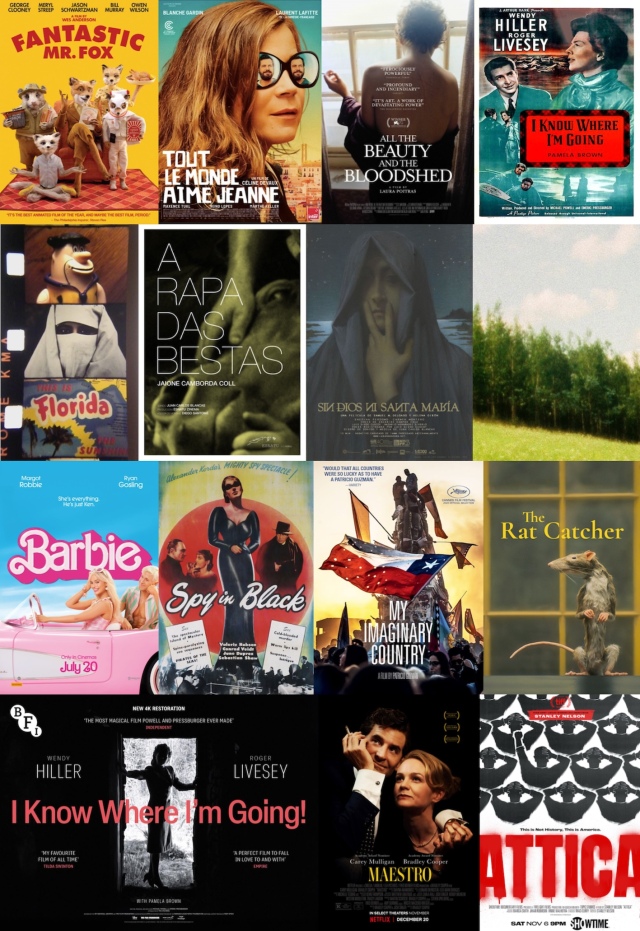
My last viewing update was towards the end of July, so I thought I’d better get on with posting this one before the year ends.
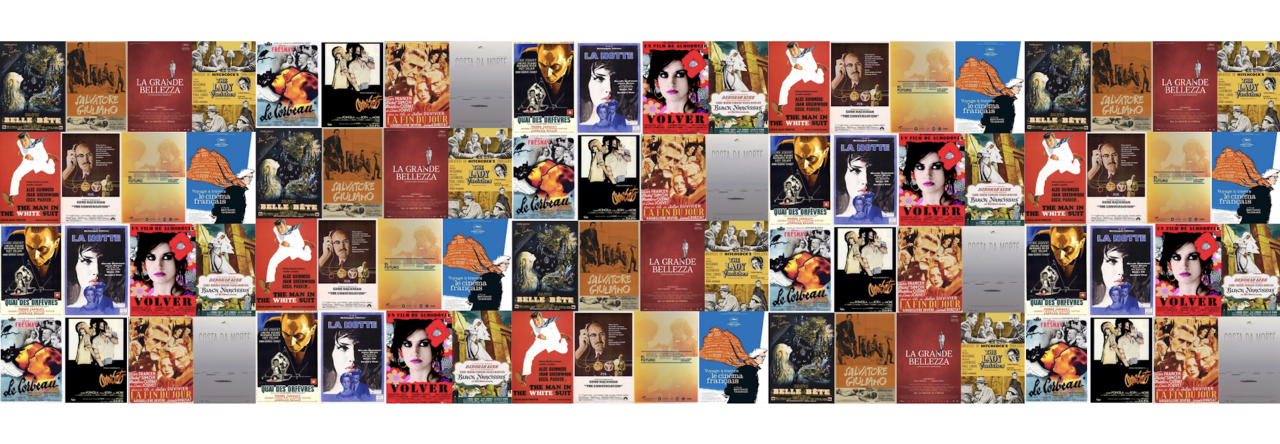
Posts that generally focus on individual films or a group of films connected by a common factor.

My last viewing update was towards the end of July, so I thought I’d better get on with posting this one before the year ends.
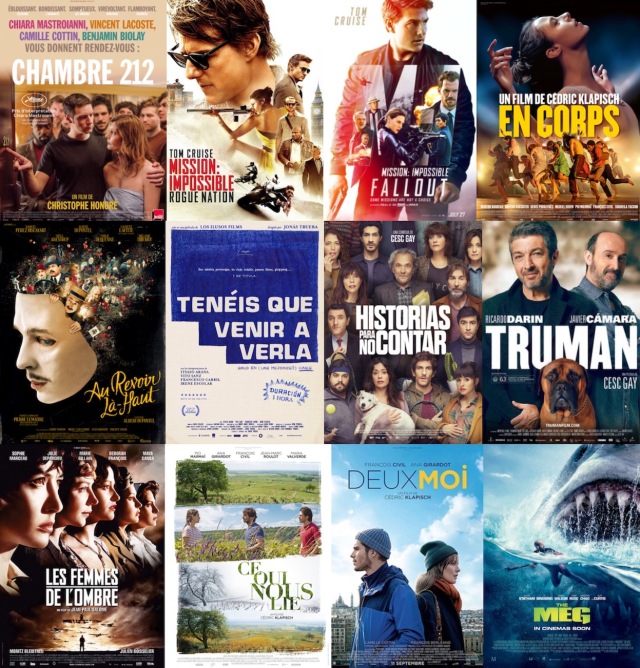
In which I go off-piste (no Tavernier-related viewing, no Ménochet, no Sorogoyen) and lose momentum.
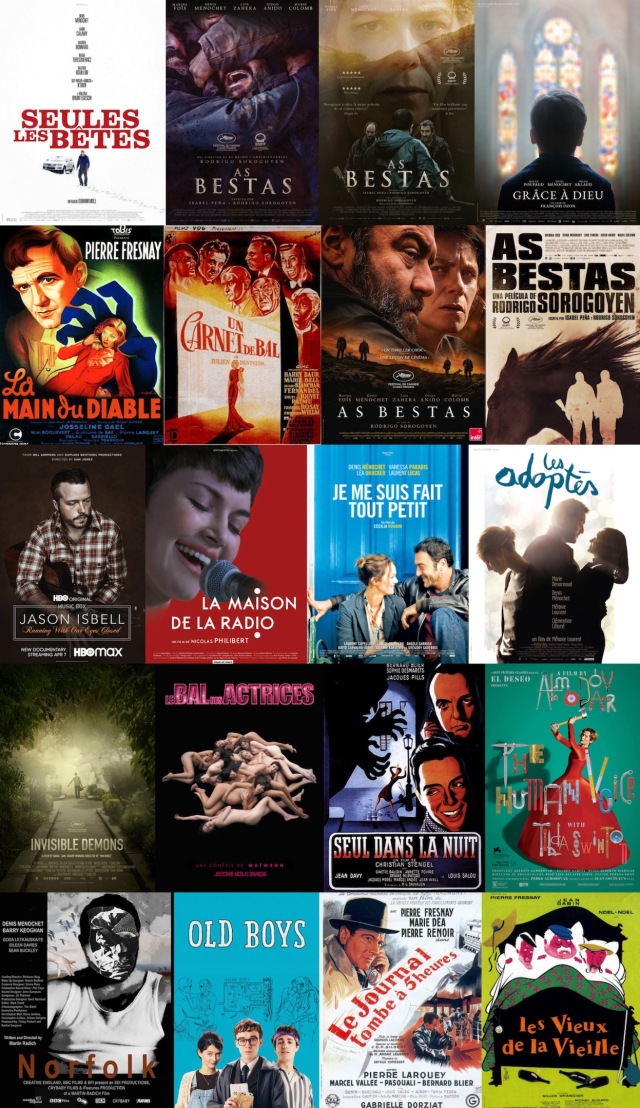
Truth be told, I did not expect to be posting my next viewing update so soon, but I’ve picked up speed and have ended up watching as many films in the past four weeks as I had watched in the previous three months. This spate of viewing productivity is mainly due to taking two weeks of annual leave and having had two bank holiday weekends, so it’s highly unlikely that I’ll keep this pace up for the rest of the year. You’ll see from the image above that I’ve continued my Tavernier mission and made further progress down the Denis Ménochet rabbit hole. I’ve actually reached my 2023 target of 40 films watched! That’s the difference that igniting curiosity and enthusiasm can make – long live rabbit holes!
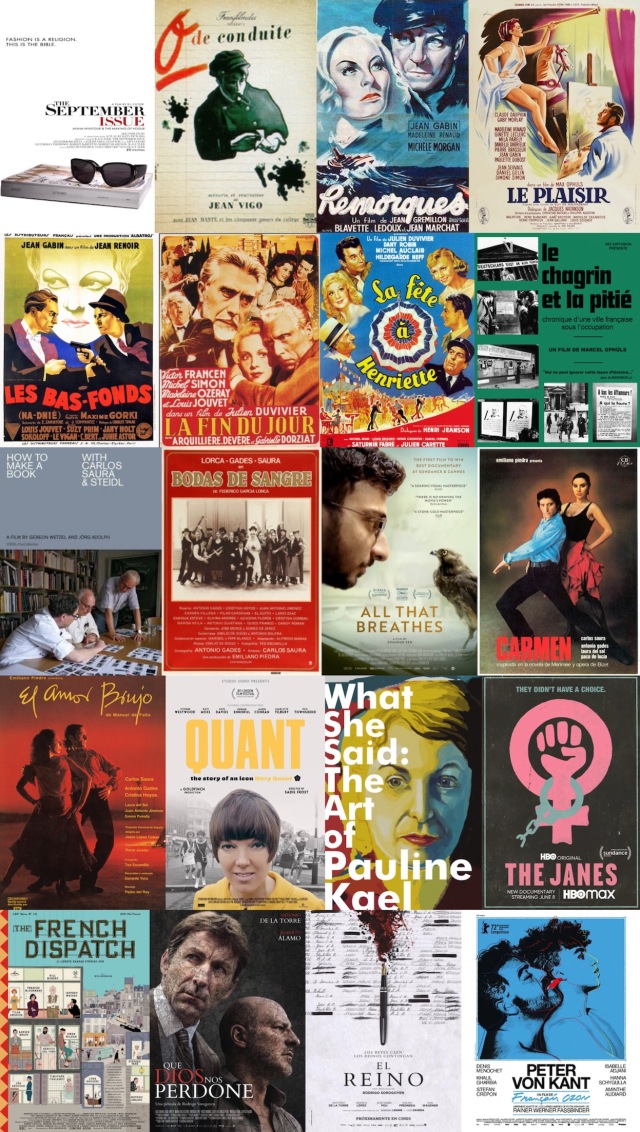
I said in my end-of-year post that I wasn’t sure I’d post anything about what I’ve been watching during the year, but I’ve decided that posting occasionally will allow me to take note of observations while they’re reasonably fresh in my mind, and also hold me accountable to my intention of increasing my viewing habits.
Viewing got off to slow start, but picked up when I settled back in to following in Tavernier’s footsteps once more. I then side-stepped into some Carlos Saura, discovered that Sky Documentaries shows recent titles, and started down a Denis Ménochet rabbit hole (in an admittedly oblique manner for the most part so far).

I won’t be viewing this year (I’m still watching the Catalan Film Festival at the moment), but the 10th Festival Márgenes is now underway. The selection of films from the Official section that are accessible to those outside of Spain can be found here (3€ for 11 films). There is a broader range of films available if you’re in Spain, including the highly recommended “Más allá del espejo” strand, which features quite a few films that I’ve watched / written about during my investigations into el otro cine español (including Costa da morte, No Cow on the Ice, Edificio España, and O futebol).

My Twitter bio used to say ‘Lives vicariously through books and films’, and I think that I have pursued escapism through books this year (films, not so much). I finally hit my ’52 books in a year’ target! I am currently reading book no.59, but I’m unlikely to finish it before the year is over. I started a new job back in May, and was doing a fair amount of background reading in the first half of the year (I applied in January and was interviewed in March, so the application process was quite elongated) – I usually only include books read ‘for fun’ or my own curiosity, but there is work-related reading in my tally this year (nothing ‘how to…’ but more thematic or topically relevant non-fiction), mainly because it was done in my own time and to answer my own questions, so it ‘counts’.
New job aside, 2019 can be characterised as ‘ugh’. We’re ending on a low. I wasn’t as shocked by the election result as I was in 2015, but I was still surprised and dismayed by the scale of the defeat. The Windrush scandal alone should have seen them turfed out on their arses…and that is the tip of the iceberg of what they have done in the last nine years. Now with a sizeable majority, they have a free rein. I don’t remember exactly what was going on at the time, but my reading a combination of ten John Sandford and Robert Crais books back-to-back over the course of two weeks or so in August is illustrative of a desire to block out the news (my literary crime sprees occur when I’m low or need distraction).
I usually list my standouts for the year in alphabetical order, but this year my favourite was far out ahead of everything else, so I’m going to list them in order of preference. My overall top 5 were:
Honourable mentions: An Honourable Man – Paul Vidich, Four Words for Friend – Marek Kohn, and The Equestrienne – Uršula Kovalyk. I’m aware that these selections are weighted towards the second half of the year, but I believe that has more to do with the first half of the year’s reading including the aforementioned background reading (and a focus on work), rather than them simply being fresher in my mind. My crime spree hit a reset button and I got on to a good run of fiction in the last few months of the year. I wouldn’t ordinarily read so many books by the same authors in one year, never mind back-to-back (even the best writers get a bit same-y or the stories run into each other, especially with recurring characters), but I was attempting to catch up on certain long running series by Sandford and Crais.
2020: I still have another series of Sandford’s to catch up with, and also Philip Kerr’s Bernie Gunther books, of which I’ve got at least four to read. I’ll keep on with the short stories and novellas – and I didn’t read as much in translation this year, so I’ll put more effort into that again. In the first half of the year I managed to read non-fiction during my morning commute and I want to re-start that (it tailed off after the summer and I either got sucked into reading the news or stared out the window instead). I still haven’t got back into longer books (I’m talking 400+ pages), but maybe this will be the year when I finally read John le Carré’s The Honourable Schoolboy.
Online articles that I’ve found interesting or thought provoking in one way or another (usual disclaimer: I don’t necessarily agree with them, but think that they are worth reading). I’m going to list them in chronological order because a number of them relate to situations that developed over the course of the year (UK politics/social issues, mainly). Where I don’t know the date, I’ve positioned them where they occur in my bookmarks (on the basis that I must have read them at that point in time). You will also notice that they are not evenly distributed throughout the year – the large gaps are where I was deliberately spending less time online, and the clusters in certain months are where I felt the need to pay attention (noticeably in relation to the General Election). There’s not much film writing included, which is indicative of my general levels of interest but also I’ve found that without Twitter I encounter less of that subject matter. Articles from The Guardian are mainly from their Long Reads series – I subscribe to the RSS feed of certain sections of the paper and those of specific journalists (part of a strategy to avoid the clickbaity provocations of the main page). The London Review of Books (LRB) has a new website and has removed the paywall until mid-January, so I’d advise you to fill your boots over there.

I was in half a mind to just have an image from the film(s) I want to talk about, but having displayed everything that I’ve read, I thought that I may as well display the entirety of what I’ve watched as well. It’s an odd assortment. Four more titles than last year but still very few in terms of my older habits. All but two of them are documentaries or documentary series – I have had zero interest in watching fiction recently.
My favourite thing that I’ve watched this year is the combination of Bertrand Tavernier’s 3 hour documentary on French cinema and his subsequent 6 part TV series that continued on the same subject (if you look closer, you’ll see that the second poster puts the title into the plural). The TV series (the French DVD set has optional English subtitles) covers the same time frame (he again stops at the point when he began making films himself) but different films and filmmakers to the documentary film – even with what must be more than 8 hours, it feels like he barely scratches the surface of his enthusiasms. As with Scorsese’s documentaries on Italian and American cinemas, you’re getting a personal view of the films rather than a straightforward history, but that’s what I find so engaging – not just that you’re getting a knowledgeable person’s recommendations, but that you’re getting introductions to titles that don’t necessarily feature in the sanctified canon. [If someone could make an equivalent for Spanish cinema, that’d be grand].
My knowledge of French cinema is fairly basic (certainly in comparison to Spanish cinema) or feels un-informed, essentially confined to what was covered in either an Introduction to Film Studies module, or a semester-long undergraduate module which concentrated on the 1980s (Besson, Beineix, Carax – and the cinéma du look) onwards. That said, French films had decent distribution during my teenage years and into my twenties, so I did watch a lot of French films – and developed a love of Claude Chabrol and Lino Ventura – both at the cinema and via Lovefilm, and initially my PhD was going to include French cinema, so I had subscriptions to French film magazines and was paying attention to what was being made at that point. But in terms of what French cinema means to French people, my understanding was limited (although the film magazines were interesting in that regard in terms of what was popular and who got coverage – that’s why I still have subscriptions to Spanish film mags; if I had to rely on information filtering through to UK/US publications, I wouldn’t know anything or anyone).
After watching Tavernier’s films, I have discovered that where Pathé and Gaumont have in recent years restored older films for French home viewing, a fair few have optional English subtitles – I now have a small pile of imported films by Duvivier, Clouzot, Lautner, Grangier, Grémillon, Becker, and others. In 2020 I’ll be looking to rekindle my interest in cinema via these treasures. I have given up on contemporary cinema at the moment – at least in terms of going to the cinema – but alongside the French imports (of old films) I am hoping to start watching some of the (recent) Spanish films that I’ve imported in the last couple of years (although I think I’ve said that in each of the equivalent posts in the last two years). So 2020 may be a year of French and Spanish cinema for me…and more documentaries, no doubt. Hasta pronto.

I completely missed Festival Márgenes last year. I don’t remember exactly how that happened – it either took place earlier than previous years (I have a vague recollection of finding out after it was over), or it coincided with me having norovirus (which I have pretty successfully blocked from my memory, but it occurred at the same time of the year). Either way, I missed something that has been an annual event on the blog since 2014 – and I have always previously found something to spark my interest, that I might not have otherwise encountered.
The festival focuses on films without theatrical distribution (a lot of the films are documentaries and there are usually quite a few medium-length films included), made on the margins (or outside) of existing film industries in the Iberian Peninsula (Spain and Portugal) and Ibero-America (Spanish and Portuguese-speaking Latin American countries). You can find an extended explanation / mission statement for the festival, here. I would characterise them as being interested in the world as it is and as it might be, openly seeking innovative forms of representation and expression, and shining a light on lives off the cinematic beaten track. A lot of the films that I’ve previously watched via Festival Márgenes feel personal to the filmmaker, like this is something that they have wanted or needed – or felt compelled – to explore and share in a visual format. Personal and collective histories have been a recurrent theme in those earlier films (although it could simply be that those were the ones that caught my attention because I’m interested in the interweaving of history and memory).
The festival’s programme is divided into several sections and takes place both online and in cinemas in Madrid. The online part – free to view, and taking place between 20th November and 8th December – focuses on the ‘Sección oficial‘. The festival summarises the selection as ‘Catorce películas de siete nacionalidades distintas que comparten un espíritu de profunda libertad y búsqueda incesante abordado desde preceptos muy dispares’ (Fourteen films of seven different nationalities, sharing a spirit of profound freedom and relentless searching approached via very disparate precepts). The films included are (links take you to the relevant streaming page – you need to register with the site to get started once the festival is live):
The films sometimes have restrictions as to which countries they can be viewed in, and they won’t necessarily have English subtitles (some have in the past). The answer re: subtitles will become apparent once the festival begins. If you speak any Spanish at all, it’s worth taking a chance anyway (and the non-Spanish language films usually have Castilian subtitles) – it doesn’t cost you anything, so you have nothing to lose, and you’ll watch something that’s unlikely to make it to a screen near you. I will be intending to at least catch the films by Xurxo Chirro (who I have previously interviewed in relation to his film Vikingland (2011)) and Affonso Uchoa.

Trailer Oficial – OBRA – Gregorio Graziosi from GREGORIO GRAZIOSI on Vimeo.
I saw Obra (which means ‘work’, but can also mean ‘building works’) in 2015, at Barcelona’s Festival Internacional de Cine D’Autor. I liked the film sufficiently that I’ve periodically checked to see whether a DVD release has surfaced – no DVD has materialised, but I’ve just discovered that it’s available to stream on Amazon Prime in the UK (here). In São Paulo, young architect Joao Carlos (Irandhir Santos) discovers a clandestine burial on the worksite of his first important project, located in a lot belonging to his family. Writing for Eye for Film back in 2015, I said that:
The opening credits set up the basic through-line of the film, that the past may be hidden but it remains underneath waiting to be discovered – a theme underlined by Joao Carlos’s wife (Lola Peploe) working as an archaeologist in the centre of the city. Shot in a silvery black and white that at times has the texture of a pencil drawing, Obra’s first images show architectural forms gradually appearing in the morning mist, ghost-like structures that slowly accumulate into the form of São Paulo – but those initial shapes and outlines can still be observed within the overall image. Throughout the film, the textures and forms of buildings are contrasted as part of the fabric of a changing city, and the black and white composition captures elements of beauty in even the most rundown corner of the dense urban sprawl.
I don’t know whether it will stand up to the version I have in my memory, but it combines two of my persistent cinematic interests in a way that stood out for me in 2015: an unusual focus on – and use of – architectural space, and the idea of the city as palimpsest. I’m generally bad at following through on intentions to watch things at a later date, but hopefully I will manage to rewatch this sometime soon.

I went to Edinburgh for the day at the weekend in order to catch two documentary films with Spanish connections at the Edinburgh International Film Festival: Hamada (Eloy Domínguez Serén, 2018) and La ciudad oculta / The Hidden City (Víctor Moreno, 2018). I’m not going to write about the latter at the moment (I would need to see it again first) – although I would recommend it, if you get the chance to see it (an immersive non-narrative experience into the underground world beneath Madrid, it put me in mind of both Dead Slow Ahead (Mauro Herce, 2015) and Alien (Ridley Scott, 1979)).
Hamada is not technically a Spanish film (although the documentary’s subject matter relates to Spain’s colonial past), but Eloy Domínguez Serén is one of the Galician filmmakers whose work I have written about previously – and I’ll be looking out for his name in the future because this is a gem of a film. My Eye for Film review of Hamada can be found here.

Mataharis is one of the films playing at EIFF as part of their Icíar Bollaín retrospective. My review for Eye for Film is here.

I’ve written about the film on here before, but I’ve now written a review for Eye for Film in relation to Arrebato‘s screening at EIFF 2019. The ***** review is here.
EIFF 2019 runs 19th – 30th June, and earlier this week they announced their full programme. As I’ve previously highlighted, their Country Focus this year is Spain – so having seen the details of the full programme, I thought that I’d pick out five Spanish-related recommendations.
This is on my list of Spanish films from last year that I want to catch up with both because I liked León Siminiani’s previous film (Mapa (2012), which likewise took the director as a central figure within the film, although that was more of a personal narrative), and also because it looks deadpan funny. It is not available on DVD, but it is on Filmin (without subtitles). Ticket details (two screenings).

I’ve already made my love for this film clear in the past – I’ve not had the chance to see it on the big screen (and I can’t go to Edinburgh on the day that it’s screening), and would encourage anyone who will be at EIFF to get a ticket NOW. Out of all of the Spanish retrospective titles, this should be your priority. Ticket details (one screening).
La ciudad oculta (Trailer) from Víctor Moreno on Vimeo.
I mentioned this one at the end of my 2018 round-up (which mainly detailed things that I hadn’t seen yet). Moreno’s previous film, Edificio España / The Building (2013) (which I wrote about at length here – and also recommend), captured the deconstruction (and intended refurbishment) of a skyscraping monument to Franco – this one appears to be the inverse, as he explores deep underground and the hidden realm under the city of Madrid. Longtime readers will know that I can’t resist films that explore unusual architectural spaces. Ticket details (two screenings).
Yes, I’m cheating here by picking a group of films rather than singling out one. Contrary to my initial impression when they first announced this retrospective, it does look like they are screening all of the feature films directed by Bollaín. I think that Te doy mis ojos / Take My Eyes (2003) is the best encapsulation of her career; it is not an easy watch (characteristically nothing is sugarcoated or simplified neatly to reassure audience expectations), but boasts two outstanding performances from Laia Marull and Luis Tosar. The bulk of Bollaín’s films are available on DVD with subtitles (some of them only as imports from Spain, but some have UK editions) and in those circumstances I tend to prioritise titles that aren’t available (or aren’t available with subtitles in a home viewing format), which in this case would point you to ¿Hola, estás sola? / Hi, Are You Alone? (1995 – Bollaín’s feature debut as a director) and Flores de otro mundo / Flowers from Another World (1999). Collectively the films illustrate Bollaín’s interest in the breadth of female experience, be that in family, love, or work – each film manages to encompass a range of lives and experiences, all looked at with compassion and solidarity. You can find ticket details for individual films by clicking on the titles on this summary page.

The Galician shorts included in the programme are:
I have written about a selection of Galician shorts previously (in relation to Curtocircuito in 2015), and will happily recommend anything that features work by Lois Patiño sight-unseen – unfortunately I won’t be in Edinburgh on the day this programme screens, otherwise this would definitely be something I would attend. Ticket details (one screening). There is also a programme of contemporary Spanish short films, which will undoubtedly also be worth checking out – Spain has a rich culture of short filmmaking, and you can frequently encounter genuine innovation and experimentation within shorts in a way that doesn’t necessarily often get seen in relation to features.
I will be reviewing a few of the Spanish films for Eye for Film (I seem to own most of the retrospective titles on DVD), so expect further posts on Spanish films at EIFF next month.